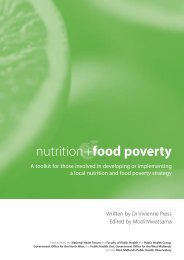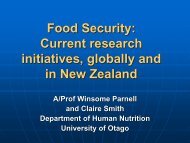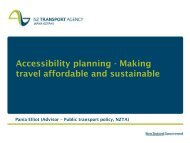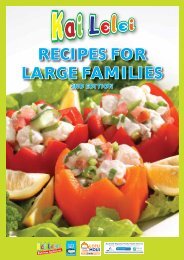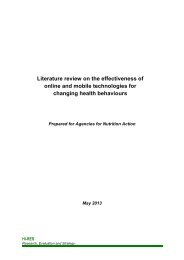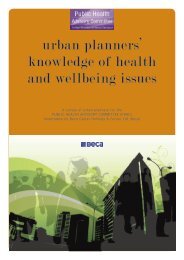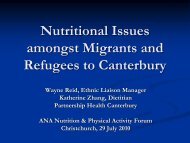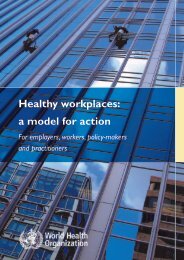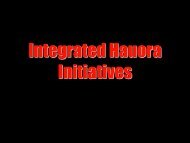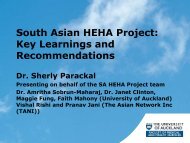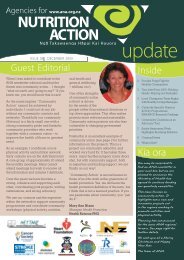enhancing food security and physical activity for maori, pacific and ...
enhancing food security and physical activity for maori, pacific and ...
enhancing food security and physical activity for maori, pacific and ...
- No tags were found...
Create successful ePaper yourself
Turn your PDF publications into a flip-book with our unique Google optimized e-Paper software.
Enhancing Food Security <strong>and</strong> Physical Activity <strong>for</strong> Māori, Pacific <strong>and</strong> Low-income PeoplesCommunity cooking classes in Canada aimed at older men noted the specific focus onmen, an accessible <strong>and</strong> community-based setting, involvement of a nutritionprofessional taking the classes, evolving the programme based on input fromparticipants, <strong>and</strong> the social component were important factors in its success. 32Potential side effectsThere are no obvious adverse potential side effects identified in the literature fromcooking skills training; however, there is a range of potential positive side effects suchas improved <strong>food</strong> hygiene, healthier eating <strong>for</strong> the family, <strong>and</strong> improved communitysupport <strong>and</strong> cohesion.Cost-benefit analysisCost-benefit analyses have been conducted <strong>for</strong> two government-funded nutritioneducation classes in the US, which are offered as part of the Exp<strong>and</strong>ed Food <strong>and</strong>Nutrition Education Program. The cost-benefit ratio of the programme in Virginia in1996 was $1:$10.64, whereas in Oregon in 2000 it was calculated as $1:$3.63. TheVirginia analysis used programme costs compared with the benefits of diseaseprevention. The Oregon analysis was based on programme costs <strong>and</strong> optimalnutrition behaviours in relation to potential health savings from diet-related chronicdisease.Other studies have calculated the cost per participant <strong>for</strong> cooking skills training.These estimates have been £9.40/student/session in 2000; 20 US$22 per participant(2002); 13 US$52,000 to implement a programme <strong>for</strong> 590 students (excludingprogramme development) in 1996; 21 <strong>and</strong> £16-30 per person/session depending onwhether equipment needed to be purchased. 18National ContextFeasibilityThere is a variety of local cooking <strong>and</strong>/or lifestyle skills initiatives existing around NewZeal<strong>and</strong>. Table 3 shows details of an environmental scan of cooking skills coursesavailable in New Zeal<strong>and</strong>. This is not intended to be a complete list of all courses, butrather to give an indication of the variety of interventions that exist. Few have beenevaluated, <strong>and</strong> they are largely local projects. Only one evaluation was identified, <strong>and</strong>this was of the Kai Lelei healthy eating <strong>and</strong> cooking course <strong>for</strong> Pacific communities.Results of the evaluation showed an improvement in knowledge of serving sizes <strong>and</strong><strong>food</strong> safety. 6 Targeting the intervention to Pacific people through churches waseffective; however, it was felt the active support of church leaders would ensuregreater attendance <strong>and</strong> may be important <strong>for</strong> sustainability. 6SustainabilitySustainability will depend to a large extent on adequate <strong>and</strong> ongoing resourcing of theprogramme. Funding of existing cooking skills courses in New Zeal<strong>and</strong> appears to belargely ad hoc, through Primary Health Organisations, District Health Boards, <strong>food</strong>banks, Healthy Eating Healthy Action, the Diabetes Projects Trust, <strong>and</strong> communitygroups such as Age Concern, Salvation Army, <strong>and</strong> churches. If a cooking skillsprogramme is to be part of a programme of interventions to address <strong>food</strong> <strong>security</strong>,then funding needs to be sustainable <strong>and</strong> secure. Long-term commitment to such aprogramme through Primary Health Organisations <strong>and</strong> District Health Boards or agovernment agency seems most appropriate. Funding of cooking skills programmesshould also include a component <strong>for</strong> evaluation.66



